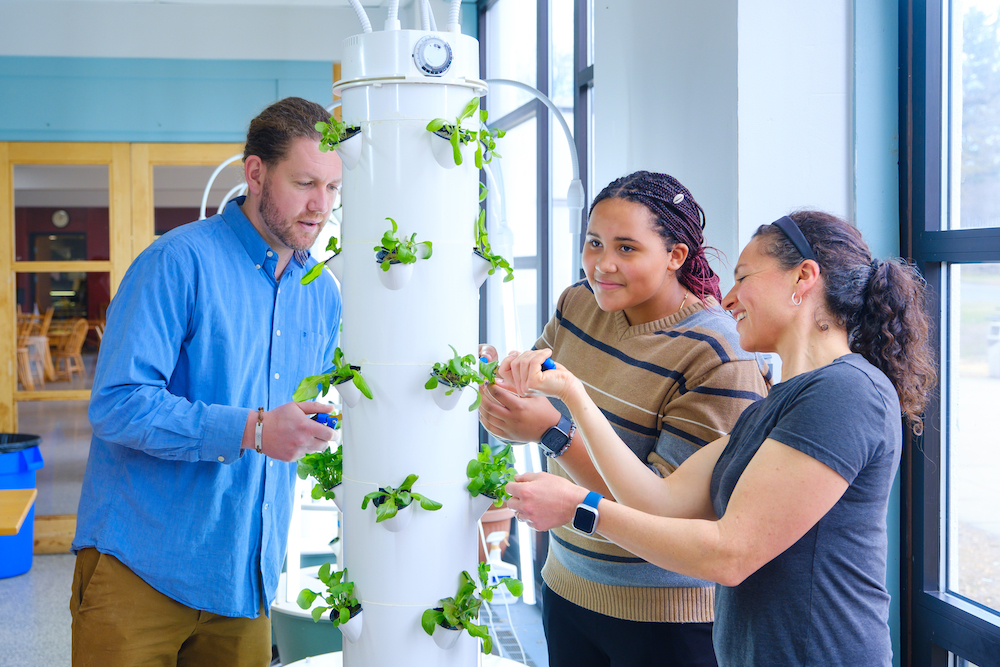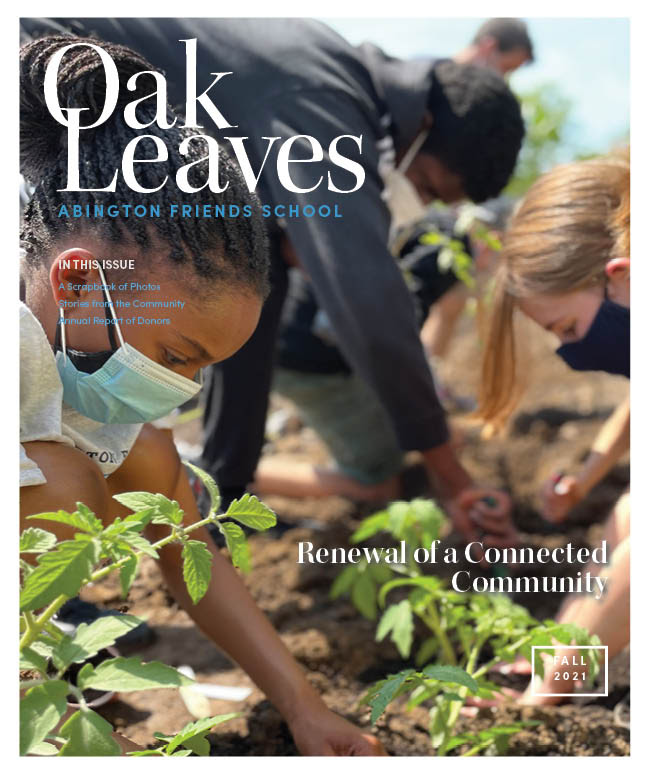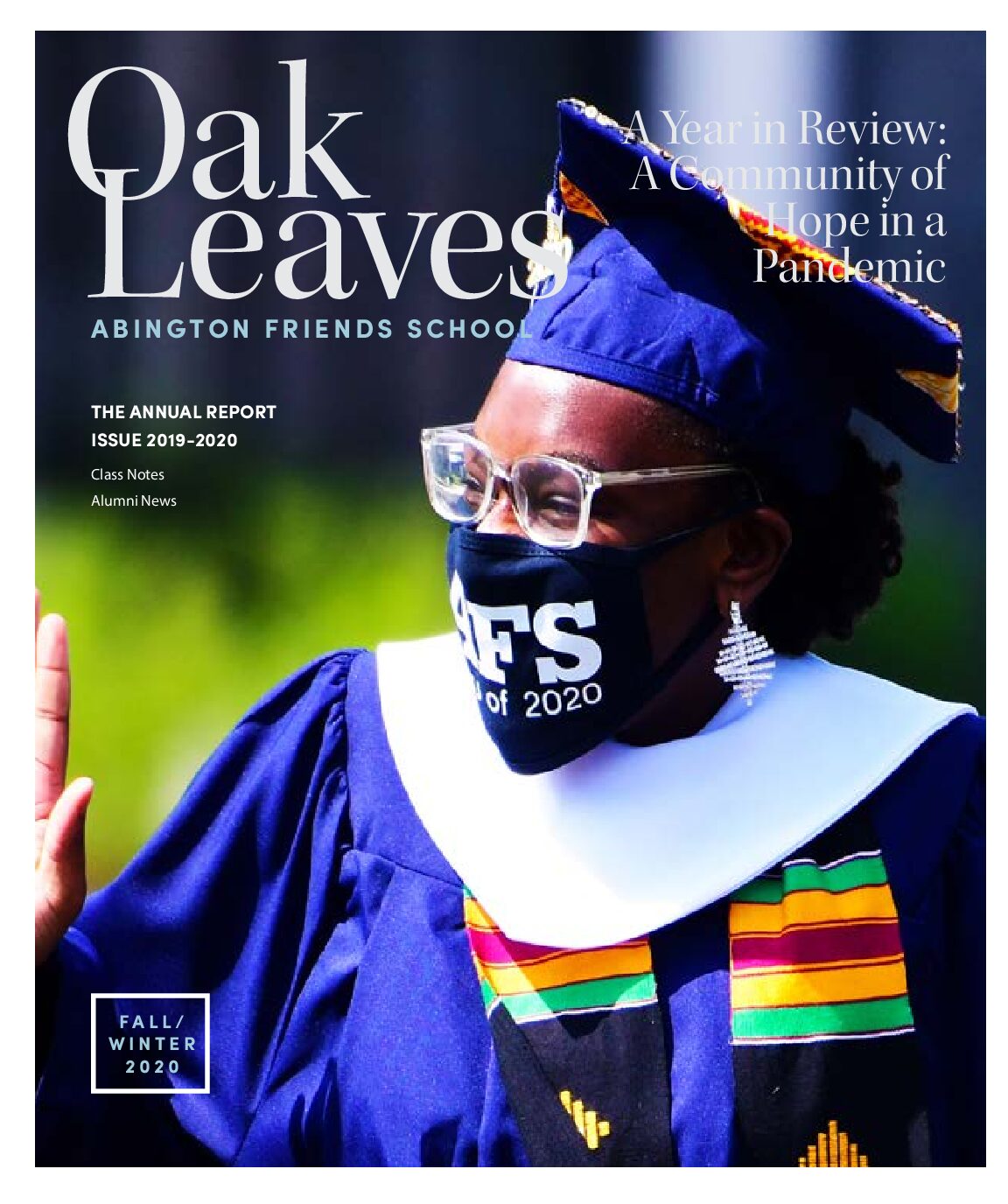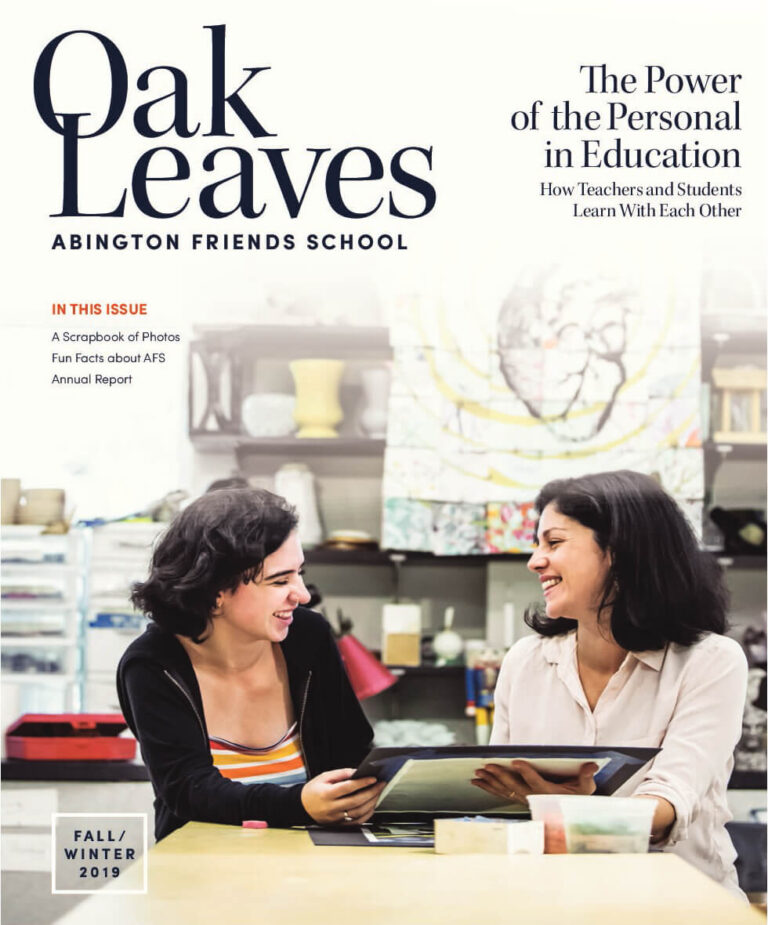Strategic Theme: Experiential Learning
Hands in the Dirt, Minds at Work
Inspire Authentic, Transformative Experiential Learning

Once upon a time, outside of the AFS cafeteria there were some raised garden beds that had been on the property for some time. Then, one day a few years ago a group of teachers commented on how great it would be to be able to restore the garden beds for clubs and science class. Not long after, a mix of teachers, students and volunteers pitched in during the Spring Break of 2021 to construct what has come to be known as the Meadow Garden.
“Given that we had been apart for some time due to COVID-19, it seemed like the time and place were ripe for us to be able to do this,” says Mike McGlinn, who has been a middle school teacher at AFS for five years. After getting everything set up and in the ground, he got a group of students involved in helping maintain it.
“They seemed to really gravitate towards the whole idea of working under the sun and seeing the fruits of their labor,” says McGlinn, who loves the fact that this kind of work gets students away from staring at screens all day long. “That’s beneficial to them, health-wise by being outside, but also [it’s great for] social-emotional learning.”
Nikki Kent, a middle school health teacher at AFS for nearly 20 years, agrees that outdoor learning is hugely beneficial.
“The school’s policy during the height of the pandemic was to be outside as much as possible,” says Kent, who also taught science this school year. “This was a great way to get kids out there doing something meaningful.”
Getting outside and digging in the dirt inspires authentic, transformative learning in the science classroom. A lot of kids don’t know what goes into their food or what kind of practices are involved that might not be healthy for them or for the planet. By working in the Meadow Garden, however, students get their hands in the dirt and are there for every piece of the growing cycle. They learn the science behind it, food justice and sovereignty throughout the process.
“What I absolutely love is the kids are willing to try vegetables, and they’re proud of their vegetables,” says McGlinn. “They don’t want to waste anything. When Nikki and I go around with the peppers in the fall that have come out of the garden, there’s a real sense of ownership and attachment, and the kids have a sense of inner joy about it.”
One day the class decided to cook kale in oil with garlic and salt.
“The kids absolutely loved it,” says McGlinn. “I’ve never seen a group of fifth-graders munch down on really healthy vegetables like that.”
The following week when a bunch of kale had been harvested, a fifth-grader asked McGlinn what he should do with it. McGlinn told him to take it home and cook it for his mom because he now had the skills to do that.
“It was really cool to see that a-ha moment for him,” says McGlinn. “We’re giving these kids tools of self-reliance.”
In today’s world, so many kids want quick and easy food. That often translates to processed foods. Kent likes to show how vegetables like tomatoes, mini peppers, and edamame are easy to pick.
“I think the Cooking Club is one of the best things we’ve done because we took the things that we grew and had the kids cook them fresh from the garden,” says Kent.
Last year, teachers gave students several plants to take home and grow.
“That, to me, is huge when a kid learns a skill in school and then takes it home and uses it with themselves or a parent,” says Kent.
The Gardening Club is now an actual class that’s become increasingly popular. Kent believes its popularity stems from the fact that students are going out and learning something organically and not even realizing it.
“It’s amazing. We start off every year with one or two kids, and it grows and grows,” says Kent. No pun intended. “Kids like to do things. They like to be busy. They don’t want to be reading 100% of their day. They want to be doing things with their hands.”
While it may seem like kids would naturally gravitate to, say, a Minecraft Club, the Garden Club appeals to them because they get to see tangible evidence of hard work. AFS teachers have found that creating an experience of learning through doing is the best way to teach because it puts ownership on the students to take control of their own learning.
“There’s more buy-in when there is real-world application,” says McGlinn.
Middle-schoolers, in particular, benefit from this way of teaching.
“I find fifth-graders to be very enthusiastic and still embody an innate curiosity, whereas eighth-graders are ready for something that’s more intellectually stimulating,” says McGlinn. “There are ways to do that all over the garden, and that’s been pretty awesome to be able to work with both age groups there.”
He says that he enjoys teaching middle school because students are capable of accomplishing so much in the world even though they often don’t get credit for it.
“For the general scope of what we cover, especially in eighth grade, these are kids that are being told no all the time. And when you give them some responsibility, a lot of times they rise to the challenge,” says McGlinn. “They’re also not bogged down by a more rigid, stringent curriculum like the upper schoolers. So I think there’s a lot more curricular freedom to be able to expand.”
According to Kent, teaching environmental science and sustainability is everything.
“We’re so reliant on resources, and we all know what’s happening in the environment, so these are just key things,” she says. “In 30 years, these will be the leaders. And the fact that they’re learning the impact now, hopefully we’ll help them become industry leaders, looking after the environment, looking after sustainability. We’ve moved away from that as a world, and it’s time to go back.”
Adds McGlinn, “The Earth sustains us. We don’t sustain the Earth.”
The students who were instrumental in the creation and maintenance of the Meadow Garden are:
- Esa McCants
- Oliver Peterson
- Niels Rush
- Nelson Cordon
- Miranda Shandell
- Kieran O’Donnell
- Yael Smith-Posner
- Jeffery Scott
- Alyson Cromar
- Mayalondyn Gray
- Catrina Reinhold
- Margaret Richards
AFS Hires Director of Experiential Learning

Over the past ten years, experiential learning programs have expanded dramatically at AFS as a key part of our strategic vision. Central to Quaker faith and practice, we believe that experience itself, well-designed and reflected upon, is essential to powerful, transformative learning. Through the Center for Experiential Learning, we have created innovative programs for cohort mentorship in fields such as medicine, law, business and farming; a global travel program; ExTerm immersive, interdisciplinary classes in the Upper School; a powerful Senior Capstone program of pursuit of deepest interests; and a program called AFS Explore that guides individual students to a wide range of external programs in science research, business, medicine, climate activism and leadership.
The spirit of experiential learning is growing in all divisions of the school, and we are excited about how this type of programming for students and teachers will continue to transform what school in the fourth century of Friends education can look like. To that end, AFS has hired Adena Dershowitz as Director for the Center for Experiential Learning—a position previously held by Rosanne Mistretta for several years. Dershowitz, currently Head of Middle School at Lycée Français de New York in New York, New York, officially joins the AFS community this summer.
“Education is not preparation for real life, but rather the years between ages three to 18 are a vital part of real life. As we do for adults, we hope that children live with joy, with purpose, and with impact. Experiential learning assures that students get chances to discover, to connect, and to make a difference in the world,” says Dershowitz. “Experiential learning takes many forms: digging for worms, collaborating with an artist, or immersion in a new culture or workplace. These experiences shape our learning and the way we make meaning of the world. They frame children’s ability to be better students, and to be healthier and more fulfilled human beings.”
Dershowitz will be collaborating with AFS faculty, students and school leadership school-wide in continuing to explore and develop opportunities and classroom curriculum for engaging students with the wider world. She will also be responsible for fostering and growing relevant community partnerships with businesses, organizations, alumni and parents to connect AFS students to internships, service learning and other experiential learning opportunities.
Dershowitz will continue to develop and oversee the Upper School’s experiential learning cohort ExTerm, Senior Capstone and the school’s Global Travel program. In addition, this new role represents the Center for Experiential Learning internally as a member of the Administrative Council and to the public at Back to School Nights, Admission Open Houses and in the external community at large as a spokesperson for the Center through partnerships. She also will lead the Faculty Council on Experiential Learning which will facilitate collaboration, consultancy and generative thinking in regards to curriculum.
“Adena emerged as a deeply insightful educator and school leader, well grounded in Mind-Brain Education research and social emotional learning with vision and passion for student centered, active learning,” says Rich Nourie, Head of School. “She’s passionate about creating authentic, transformative learning experiences for students with her colleagues.”
Dershowitz, a passionate educator and school administrator, devoted wife, and mother of five-year-old twins, has experience teaching children of many age groups as well as developing professional learning for faculty. She has success in developing curricular programs, assisting in the design of learning spaces, and creating and implementing new initiatives. She says she’s enthusiastic about joining the AFS community for a number of reasons.
“I was struck by how Quaker values and commitment to the whole child are truly lived day-to-day,” says Dershowitz, who visited classrooms in the lower, middle, and upper school when she was on campus. She was impressed by how students were actively engaged in their learning about important and resonant topics. “My conversations with adults in the school led me to realize that AFS is at the forefront of doing what’s best for children and adolescents,” says Dershowitz. “I’m looking forward to collaborating with the incredible faculty and staff to provide meaningful learning experiences for all students.”


